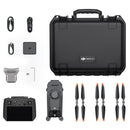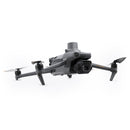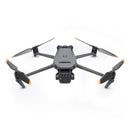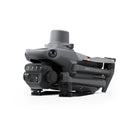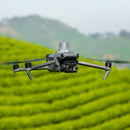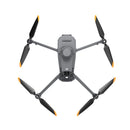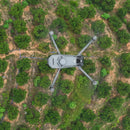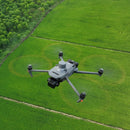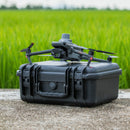Meet the game-changer in precision agriculture: the DJI Mavic 3 Multispectral. Engineered for farmers and agronomists, this drone is a powerhouse of aerial surveying capabilities. The Mavic 3M uniquely combines a high-resolution 20MP RGB camera with a state-of-the-art multispectral imaging system featuring a 4-band (Green, Red, Red Edge, Near-Infrared) 5MP camera. This dual-camera setup is designed to make the invisible visible, offering unprecedented insights into crop health and growth patterns.
|
|
|
|
|
|
|
|
|
|
The most valuable aerial data to collect in agriculture is invisible. However, with the all-new DJI Mavic 3 Multispectral you now have the ability to capture both RGB and multispectral data simultaneously, making the invisible visible. Scanning, measuring, and quantifying crop data has never been easier with the Mavic 3M. The Mavic 3M features a 4/3" CMOS 20MP RGB camera as well as a 4-band (G,R,RE,NIR) 5MP multispectral camera. Flight times average 36-42 minutes with max flight endurance (without wind) is 43-minutes. This endurance will give you the ability to fly just under 500-acres in a single flight. Additionally, M3M is also compatible with an RTK module for increased position accuracy.
See More, Work Smarter
Highly Integrated Imaging System
Multispectral + RGB imaging system
Newly upgraded imaging system with one 20MP RGB camera and four 5MP multispectral cameras (green, red, red edge, and near infrared0. Enables applications such as high-precision aerial surveying, crop growth monitoring, and natural resource surveys.
RGB Camera Characteristics
4/3 CMOS
20MP Image Sensor
1/2000s
Mechanical Shutter Speed
0.7s
High-speed burst when RGB camera is used
Sunlight Sensor
The built-in sunlight sensor captures solar irradiance and records it in an image file, allowing for light compensation of image data during 2D reconstruction. This results in more accurate NDVI results, as well as improved accuracy and consistency of data acquired over time.
Accurate images that capture every pixel
RTK module
Mavic 3M with RTK module for centimeter-level positioning. Flight control, the camera, and the RTK module sync in microseconds to accurately capture the location of each camera's imaging center. This enables Mavic 3M to do high-precision aerial surveying without using ground control points.
Efficient and reliable battery life
Ultra-long battery life, fast bursts
43 minutes
Flight Time
200 hectare
A single flight can complete mapping operations over an area of 200 hectares.
Fast charging
100W Battery Charging Hub
High-efficiency fast charging
88W fast charging
Aircraft

Stable signal, smooth image transmission
The O3 transmission integrates two transmitting signals and four receiving signals to support 15km ultra-long transmission distances.

Omnidirectional obstacle sensing, terrain-follow aerial surveying
M3M features multiple wide-FOV vision sensors that accurately detect obstacles in all directions for omnidirectional obstacle avoidance. The terrain-follow aerial surveying can be easily performed in steep-slope landscapes.
Applications

Orchard mapping
M3M allows terrain-follow aerial surveying of orchards, even on sloped landscapes. Together with DJI Terra or DJI SmartFarm Platform [6] to reconstruct high-resolution orchard maps, automatically identify the number of trees, distinguish trees from other obstacles or objects, and generate three-dimensional operation routes for agricultural drones, making operations safer and more efficient.

Guide variable rate applications
For rice fertilization, cotton growth regulation, and potato foliar fertilizer spraying, the Mavic 3M is used to obtain multi-spectral images of crops. DJI Terra or the DJI SmartFarm Platform can then generate NDVI and other vegetation indices maps, capturing differences in crop potential and generating prescription maps that allow agricultural drones to execute variable-rate application. This ultimately allows users to reduce costs, increase yield, and protect the environment.

Intelligent field scouting
The M3M can carry out automatic field scouting. The field scout images can be uploaded to the DJI SmartFarm Platform in real time through a 4G network. It can find abnormalities, such as emergence deficiencies, weed pressure, and crop lodging in a timely manner. It can also conduct intelligent analyses, such as cotton seedling identification and rice production testing, using AI identification for real-time sharing of crop growth information, guidance of agronomic activities, and easy management of 70 hectares of farmland by one person.

Environmental Monitoring and Natural Resources Survey
The Mavic 3M can also be used in environment and natural resource surveys, such as water enrichment monitoring, forest distribution surveys, urban green area surveys, and more.
Open Ecosystem
Cloud API
The Mavic 3M can be directly connected to a third-party cloud platform via Pilot 2's built-in DJI Cloud API based on the MQTT protocol. There is no need to develop an app separately to enable the transmission of UAV equipment information, live streaming, photo data, and other information.
MSDK
The Mavic 3M supports Mobile SDK 5 (MSDK5) with a fully open-source production code sample. The MSDK5 makes it possible to develop a proprietary control app for UAV field patrol, smart surveying, and other scenarios, making it more user-friendly.
The most valuable aerial data to collect in agriculture is invisible. However, with the all-new DJI Mavic 3 Multispectral you now have the ability to capture both RGB and multispectral data simultaneously, making the invisible visible. Scanning, measuring, and quantifying crop data has never been easier with the Mavic 3M. The Mavic 3M features a 4/3" CMOS 20MP RGB camera as well as a 4-band (G,R,RE,NIR) 5MP multispectral camera. Flight times average 36-42 minutes with max flight endurance (without wind) is 43-minutes. This endurance will give you the ability to fly just under 500-acres in a single flight. Additionally, M3M is also compatible with an RTK module for increased position accuracy.
See More, Work Smarter
Highly Integrated Imaging System
Multispectral + RGB imaging system
Newly upgraded imaging system with one 20MP RGB camera and four 5MP multispectral cameras (green, red, red edge, and near infrared0. Enables applications such as high-precision aerial surveying, crop growth monitoring, and natural resource surveys.
RGB Camera Characteristics
4/3 CMOS
20MP Image Sensor
1/2000s
Mechanical Shutter Speed
0.7s
High-speed burst when RGB camera is used
Sunlight Sensor
The built-in sunlight sensor captures solar irradiance and records it in an image file, allowing for light compensation of image data during 2D reconstruction. This results in more accurate NDVI results, as well as improved accuracy and consistency of data acquired over time.
Accurate images that capture every pixel
RTK module
Mavic 3M with RTK module for centimeter-level positioning. Flight control, the camera, and the RTK module sync in microseconds to accurately capture the location of each camera's imaging center. This enables Mavic 3M to do high-precision aerial surveying without using ground control points.
Efficient and reliable battery life
Ultra-long battery life, fast bursts
43 minutes
Flight Time
200 hectare
A single flight can complete mapping operations over an area of 200 hectares.
Fast charging
100W Battery Charging Hub
High-efficiency fast charging
88W fast charging
Aircraft

Stable signal, smooth image transmission
The O3 transmission integrates two transmitting signals and four receiving signals to support 15km ultra-long transmission distances.

Omnidirectional obstacle sensing, terrain-follow aerial surveying
M3M features multiple wide-FOV vision sensors that accurately detect obstacles in all directions for omnidirectional obstacle avoidance. The terrain-follow aerial surveying can be easily performed in steep-slope landscapes.
Applications

Orchard mapping
M3M allows terrain-follow aerial surveying of orchards, even on sloped landscapes. Together with DJI Terra or DJI SmartFarm Platform [6] to reconstruct high-resolution orchard maps, automatically identify the number of trees, distinguish trees from other obstacles or objects, and generate three-dimensional operation routes for agricultural drones, making operations safer and more efficient.

Guide variable rate applications
For rice fertilization, cotton growth regulation, and potato foliar fertilizer spraying, the Mavic 3M is used to obtain multi-spectral images of crops. DJI Terra or the DJI SmartFarm Platform can then generate NDVI and other vegetation indices maps, capturing differences in crop potential and generating prescription maps that allow agricultural drones to execute variable-rate application. This ultimately allows users to reduce costs, increase yield, and protect the environment.

Intelligent field scouting
The M3M can carry out automatic field scouting. The field scout images can be uploaded to the DJI SmartFarm Platform in real time through a 4G network. It can find abnormalities, such as emergence deficiencies, weed pressure, and crop lodging in a timely manner. It can also conduct intelligent analyses, such as cotton seedling identification and rice production testing, using AI identification for real-time sharing of crop growth information, guidance of agronomic activities, and easy management of 70 hectares of farmland by one person.

Environmental Monitoring and Natural Resources Survey
The Mavic 3M can also be used in environment and natural resource surveys, such as water enrichment monitoring, forest distribution surveys, urban green area surveys, and more.
Open Ecosystem
Cloud API
The Mavic 3M can be directly connected to a third-party cloud platform via Pilot 2's built-in DJI Cloud API based on the MQTT protocol. There is no need to develop an app separately to enable the transmission of UAV equipment information, live streaming, photo data, and other information.
MSDK
The Mavic 3M supports Mobile SDK 5 (MSDK5) with a fully open-source production code sample. The MSDK5 makes it possible to develop a proprietary control app for UAV field patrol, smart surveying, and other scenarios, making it more user-friendly.
DJI Mavic 3 Multispectral Specifications
Aircraft
| Net Weight (with propellers and RTK module) | 951 g |
|
Max Takeoff Weight |
1,050 g |
|
Dimensions |
Folded (without propellers): 223×96.3×122.2 mm (Length×Width×Height) Unfolded (without propellers): 347.5×283×139.6 mm (Length×Width×Height) |
|
Diagonal Distance |
380.1 mm |
|
Max Ascent Speed |
6 m/s (Normal Mode) 8 m/s (Sport Mode) |
|
Max Descent Speed |
6 m/s (Normal Mode) 6 m/s (Sport Mode) |
| Max Flight Speed (at sea level, no wind) | 15 m/s (Normal Mode) Flying forward: 21 m/s, flying sideways: 20 m/s, flying backwards: 19 m/s (Sport mode) |
| Max Wind Speed Resistance | 12 m/s |
| Max Take-off Altitude Above Sea Level | 6000 m (without payload) |
| Max Flight Time (no wind) | 43 minutes |
| Max Hover Time (no wind) | 37 minutes |
|
Max Flight Distance |
32 km |
|
Max Pitch Angle |
30° (Normal Mode) 35° (Sport Mode) |
| Max Angular Velocity | 200°/s |
|
GNSS |
GPS+Galileo+BeiDou+GLONASS (GLONASS is supported only when the RTK module is enabled) |
|
Hovering Accuracy |
Vertical: ±0.1 m (with Vision System); ±0.5 m (with GNSS); ±0.1 m (with RTK) Horizontal: ±0.3 m (with Vision System); ±0.5 m (with High-Precision Positioning System); ±0.1 m (with RTK) |
|
Operating Temperature |
-10° to 40° C (14° to 104° F) |
|
Internal Storage |
N/A |
|
Motor Model |
2008 |
|
Propeller Model |
9453F Propellers for Enterprise |
| Light Sensor | Built-in module |
RGB Camera
| Sensor | 4/3 CMOS Effective Pixels: 20 MP |
|
Lens |
FOV: 84° Equivalent focal length: 24 mm Aperture: f/2.8 to f/11 Focus: 1 m to ∞ |
|
ISO Range |
100-6400 |
|
Shutter Speed |
Electronic Shutter: 8-1/8000 s Mechanical Shutter: 8-1/2000 s |
|
Max Image Size |
5280×3956 |
| Still Photography Modes |
Single shot: 20 MP Timelapse: 20 MP JPEG: 0.7/1/2/3/5/7/10/15/20/30/60 s JPEG + RAW: 3/5/7/10/15/20/30/60 s Panorama: 20 MP (original material) |
|
Video Resolution |
H.264 4K: 3840×2160@30fps FHD: 1920×1080@30fps |
| Bitrate | 4K: 130 Mbps FHD: 70 Mbps |
|
Supported File Formats |
exFAT |
| Photo Format |
JPEG/DNG (RAW) |
| Video Format |
MP4 (MPEG-4 AVC/H.264) |
Multispectral Camera
|
Sensor |
1/2.8-inch CMOS, effective pixels: 5 MP |
| Lens | FOV: 73.91° (61.2° x 48.10°) Equivalent focal length: 25 mm Aperture: f/2.0 Focus: Fixed Focus |
|
Multispectral Camera Band |
Green (G): 560 ± 16 nm; Red (R): 650 ± 16 nm; Red Edge (RE): 730 ± 16 nm; Near infrared (NIR): 860 ± 26 nm; |
|
Gain Range |
1x-32x |
|
Shutter Speed |
Electronic Shutter: 1/30~1/12800 s |
|
Max Image Size |
2592×1944 |
| Image Format |
TIFF |
|
Video Format |
MP4 (MPEG-4 AVC/H.264) |
| Photo Shooting Mode |
Single shot: 5 MP Timelapse: 5 MP TIFF: 2/3/5/7/10/15/20/30/60 s |
|
Video Resolution |
H.264 FHD: 1920 x 1080@30fps Video content: NDVI/GNDVI/NDRE |
| Max Video Bitrate |
Stream: 60 Mbps |
Gimbal
|
Stabilization |
3-axis (tilt, roll, pan) |
|
Mechanical Range |
Tilt: -135° to 45° Roll: -45° to 45° Pan: -27° to 27° |
|
Controllable Range |
Tilt: -90° to 35° Pan: Not controllable |
| Max Control Speed (tilt) |
100°/s |
| Angular Vibration Range |
±0.007° |
Sensing
|
Type |
Omnidirectional binocular vision system, with an infrared sensor at the bottom of the aircraft |
| Forward | Distance Measuring Range: 0.5 m to 20 m Detection Range: 0.5 m to 200 m Effective Obstacle Avoidance Speed: Flight Speed ≤15 m/s FOV: Horizontal 90°, vertical 103° |
|
Backward |
Distance Measuring Range: 0.5 m to 16 m Effective Obstacle Avoidance Speed: Flight speed ≤12 m/s FOV: Horizontal 90°, vertical 103° |
| Lateral | Distance Measuring Range: 0.5 m to 25 m Effective Obstacle Avoidance Speed: Flight speed ≤15 m/s FOV: Horizontal 90°, vertical 85° |
| Upward |
Distance Measuring Range: 0.2 m to 10 m Effective Obstacle Avoidance Speed: Flight Speed ≤6 m/s FOV: Front and rear 100°, left and right 90° |
| Downward | Distance Measuring Range: 0.3 m to 18 m Effective Obstacle Avoidance Speed: Flight speed ≤6 m/s FOV: Front and rear 130°, left and right 160° |
| Operating Environment | Forward, Backward, Lateral, and Upward: Surface with a clear pattern and adequate Front, Rear, Left, Right, Above: Surfaces with clear patterns and adequate lighting (> 15 lux, environments with normal indoor fluorescent light exposure) Below: Surfaces with diffuse reflection material and a reflectivity of >20% (such as walls, trees, people, etc.); Adequate lighting (>15 lux, environments with normal indoor fluorescent light exposure)) |
Video Transmission
|
Video Transmission System |
DJI O3 Image Transmission Industry Edition |
|
Live View Quality |
Remote Controller: 1080p/30fps |
| Operating Frequency | 2.400-2.4835 GHz 5.725-5.850 GHz |
| Max Transmission Distance (unobstructed, free of interference) |
FCC: 15 km CE: 8 km SRRC: 8 km MIC: 8 km |
|
Max Transmission Distance (Obstructed) |
Strong Interference (urban landscapes, residential areas, etc.): 1.5-3 km (FCC/CE/SRRC/MIC) Medium Interference (suburban landscapes, city parks, etc.): 3-9 km (FCC), 3-6 km (CE/SRRC/MIC) Weak Interference (remote fields, open farmland, etc.): 9-15 km (FCC), 6-8 km (CE/SRRC/MIC) |
|
Max Download Speed |
115 MB/s (with DJI RC Pro Industry Edition) |
|
Latency (depending on environmental conditions and mobile device) |
Approx. 200 ms |
|
Antenna |
4 antennas, 2 transmitting and 4 receiving |
|
Transmission Power (EIRP) |
2.4 GHz: <33 dBm (FCC), <20 dBm (CE/SRRC/MIC) 5.8 GHz: <33 dBm (FCC), <30 dBm (SRRC), <14 dBm (CE) |
DJI RC Pro Enterprise
|
Video Transmission System |
DJI O3 Image Transmission Industry Edition |
|
Max Transmission Distance (unobstructed, free of interference) |
FCC: 15 km CE/SRRC/MIC: 8 km |
|
Video Transmission Operating Frequency |
2.400-2.4835 GHz 5.725-5.850 GHz |
|
Video Transmission Transmitter Power (EIRP) |
2.4 GHz: <33 dBm (FCC), <20 dBm (CE/SRRC/MIC) 5.8 GHz: <33 dBm (FCC), <14 dBm (CE), <23 dBm (SRRC) |
|
Wi-Fi Protocol |
802.11 a/b/g/n/ac/ax Support 2×2 MIMO Wi-Fi |
| Wi-Fi Operating Frequency |
2.400-2.4835 GHz 5.150-5.250 GHz 5.725-5.850 GHz |
|
Wi-Fi Transmitter Power (EIRP) |
2.4 GHz: <26 dBm (FCC), <20 dBm (CE/SRRC/MIC) 5.1 GHz: <26 dBm (FCC), <23 dBm (CE/SRRC/MIC) 5.8 GHz: <26 dBm (FCC/SRRC), <14 dBm (CE) |
| Bluetooth Protocol |
Bluetooth 5.1 |
| Bluetooth Operating Frequency |
2.400-2.4835 GHz |
| Bluetooth Transmitter Power (EIRP) |
< 10 dBm |
| Screen Resolution |
1920×1080 |
| Screen Size |
5.5 inches |
| Screen |
60 fps |
| Brightness |
1,000 nits |
| Touchscreen Control |
10-point multi-touch |
| Battery |
Li-ion (5000 mAh @ 7.2 V) |
| Charging Type |
Recommended to be charged with the included DJI USB-C Power Adapter (100W) or USB charger at 12 V or 15 V |
| Rated Power |
12 W |
| Storage Capacity |
Internal Storage (ROM): 64 GB Supports a microSD card for expanded capacity. |
| Charging Time |
Approx. 1 hour 30 minutes (with the included DJI USB-C Power Adapter (100W) only charging the remote controller or a USB charger at 15 V) Approx. 2 hours (with a USB charger at 12 V) Approx. 2 hours 50 minutes (with the included DJI USB-C Power Adapter (100W) charging the aircraft and remote controller simultaneously) |
| Operating Time |
Approx. 3 hours |
| Video Output Port |
Mini-HDMI port |
| Operating Temperature Range |
-10° to 40° C (14° to 104° F) |
| Storage Temperature |
-30° to 60° C (-22° to 140° F) (within one month) -30° to 45° C (-22° to 113° F) (one to three months) -30° to 35° C (-22° to 95° F) (three to six months) -30° to 25° C (-22° to 77° F) (more than six months) |
| Charging Temperature |
5° to 40° C (41° to 104° F) |
| Supported DJI Aircraft | DJI Mavic 3E DJI Mavic 3T |
| GNSS | GPS+Galileo+GLONASS |
| Dimensions |
Antennas folded and controller sticks unmounted: 183.27×137.41×47.6 mm (L×W×H) Antennas unfolded and controller sticks mounted: 183.27×203.35×59.84 mm (L×W×H) |
| Weight |
Approx. 680 g |
| Model |
RM510B |
Storage
|
Supported Memory Cards |
Aircraft: Please use a memory card with a speed rating of V30 or higher, or use a memory card from the recommended list |
|
Recommended microSD Cards |
Remote Controller: SanDisk Extreme PRO 64GB V30 A2 microSDXC SanDisk High Endurance 64GB V30 microSDXC SanDisk Extreme 128GB V30 A2 microSDXC SanDisk Extreme 256GB V30 A2 microSDXC SanDisk Extreme 512GB V30 A2 microSDXC Lexar 667x 64GB V30 A2 microSDXC Lexar High-Endurance 64GB V30 microSDXC Lexar High-Endurance 128GB V30 microSDXC Lexar 667x 256GB V30 A2 microSDXC Lexar 512GB V30 A2 microSDXC Samsung EVO Plus 64GB V30 microSDXC Samsung EVO Plus 128GB V30 microSDXC Samsung EVO Plus 256GB V30 microSDXC Samsung EVO Plus 512GB V30 microSDXC Kingston Canvas Go! Plus 128GB V30 A2 microSDXC Kingston Canvas React Plus 128GB V90 A1 microSDXC Aircraft: SanDisk Extreme 32GB V30 A1 microSDHC SanDisk Extreme PRO 32GB V30 A1 microSDHC SanDisk Extreme 512GB V30 A2 microSDXC Lexar 1066x 64GB V30 A2 microSDXC Kingston Canvas Go! Plus 64GB V30 A2 microSDXC Kingston Canvas React Plus 64GB V90 A1 microSDXC Kingston Canvas Go! Plus 128GB V30 A2 microSDXC Kingston Canvas React Plus 128GB V90 A1 microSDXC Kingston Canvas React Plus 256GB V90 A2 microSDXC Samsung PRO Plus 256GB V30 A2 microSDXC |
DJI Mavic 3 Intelligent Battery
| Capacity | 5000 mAh |
|
Standard Voltage |
15.4 V |
| Max Charging Voltage |
17.6 V |
| Type |
LiPo 4S |
| Chemical System |
LiCoO2 |
| Energy |
77 Wh |
| Weight |
335.5 g |
| Charging Temperature |
5° to 40° C (41° to 104° F) |
Charger
|
Input |
100-240 V (AC Power), 50-60 Hz, 2.5 A |
|
Output Power |
100 W |
|
Output |
Max. 100 W (total) When both ports are used, the maximum output power of each interface is 82 W, and the charger will dynamically allocate the output power of the two ports according to the load power. |
DJI Mavic 3 Enterprise Battery Charging Hub (100W) (Sold Separately)
|
Input |
USB-C: 5-20 V, 5.0 A |
| Output | Battery Port: 12-17.6 V, 8.0 A |
|
Rated Power |
100 W |
|
Charging Type |
Three batteries charged in sequence |
|
Charging Temperature Range |
5° to 40° C (41° to 104° F) |
RTK Module
| Dimensions | 50.2×40.2×66.2 mm (L×W×H) |
|
Weight |
24±2 g |
|
Interface |
USB-C |
| Power |
Approx. 1.2 W |
|
RTK Positioning Accuracy |
RTK Fix: Horizontal: 1 cm + 1 ppm; Vertical: 1.5 cm + 1 ppm |
| Energy |
77 Wh |
| Weight |
335.5 g |
| Charging Temperature |
5° to 40° C (41° to 104° F) |
DJI Mavic 3 Enterprise Speaker (Sold Separately)
| Dimensions | 114.1×82.0×54.7 mm (L×W×H) |
|
Weight |
85±2 g |
|
Interface |
USB-C |
|
Rated Power |
3 W |
| Max Volume | 110 dB @ 1 m |
| Effective Broadcast Distance | 100 m @ 70 dB |
|
Bit Rate |
16 Kbps/32 Kbps |
|
Operating Temperature Range |
-10° to 40° C (14° to 104° F) |
(1) DJI Mavic 3M Aircraft with RTK Module & SD Card (1)
(1) RC Pro Enterprise Smart Controller
(1) Mavic 3 Intelligent Flight Battery
(3) Mavic 3 Enterprise Propellers (Pairs)
(1) RTK Module
(1) Charger
(1) Power Cable
(1) USB-C Cable
(1) USB-C to USB-C Cable
(1) Protector Case
(1) Screwdriver
(1) Manual
Introducing DJI Mavic 3 Multispectral
From Sky to Glass | Using Mavic 3 Multispectral To Manage Vineyards
What use cases or industries is the Mavic 3 Multispectral best for?
The DJI Mavic 3 Multispectral is a specialized drone designed primarily for precision agriculture and environmental monitoring. Its multispectral imaging capabilities make it a valuable tool in soil and field analysis, plant counting and scouting, disease and pest detection, irrigation management, land cover mapping, forestry, and water quality assessment.
How does multispectral imaging work on the Mavic 3 Multispectral?
Multispectral imaging on the Mavic 3 Multispectral involves capturing data at different wavelengths of light, including both visible and invisible spectra. This data is used to analyze various aspects of plant health and soil conditions.
Does the Mavic 3M kit include an RTK Module?
Yes, an RTK Module is included in with this purchase.
What's included in the DJI Mavic 3 Multispectral Bundle?
Click on the In the Box tab for a full list of what's included.
Does DJI Mavic 3M support image position compensation?
Each of the five camera sensor centers has been compensated in the photo EXIF coordinates according to its position relative to the on-board D-RTK antenna phase center. When the images are mapped, the DJI Terra or DJI SmartFarm Platform automatically uses this parameter for position compensation to ensure the accuracy of the map position.
Does the DJI Mavic 3M camera have distortion correction?
Distortions in visible and multispectral cameras are individually corrected before they are shipped.
What types of vegetation indices can the Mavic 3 Multispectral measure?
It can measure various vegetation indices, including the Normalized Difference Vegetation Index (NDVI), which is widely used to assess plant health and biomass.
Is the Mavic 3 Multispectral suitable for large-scale farming operations?
Yes, it is ideal for large-scale farming operations due to its ability to cover large areas quickly and provide detailed insights into crop health and soil conditions.
Can the Mavic 3 Multispectral be used for environmental conservation?
Yes, it can be used for environmental conservation tasks, such as monitoring vegetation in protected areas, assessing the health of natural habitats, and studying the impact of environmental changes.
Is specialized software required to process the data from the Mavic 3 Multispectral?
Yes, specialized software is usually required to process and analyze the multispectral data effectively. We recommend looking at Solvi or Aeroview, depeding on the crop type.
What is the maximum amount of acres that can be flown on one flight?
If flown at 400', it is possible to cover just under 500-acres.
Are both the RGB and multispectral cameras mechanical shutter?
Yes, both cameras have a mechanical shutter, which is preferred for mapping purposes.
What bands are make up the multispectral camera?
There are four bands: Red (R), Green (G), Red Edge (RE), and Near-infrared (NIR).
Does DJI Mavic 3M support KML and KMZ file imports and what are the import path requirements?
The DJI Pilot 2 App supports importing polygon boundaries and waypoint missions for pre-planned aerial photography with KML/KMZ files. Import path: Route > KMZ Import > Select Table of Contents > Internal Storage/SD Card > Locate the KML/KMZ file
Are lighting conditions recorded in the metadata of the multispectral images?
Yes, with the built-in sunlight sensor, solar irradiance is recorded within the metadata of each multispectral image. This is essential for data processing and the generation of accurate vegetation indices.
What should I be aware of when using the DJI Mavic 3M’s sunlight sensor?
Avoid blocking the sunlight sensor during use, as it affects vegetation indices like NDVI. Do not rub the sensor to prevent scratches.
Is DJI Mavic 3M waterproof?
No.
How does DJI Mavic 3M use network RTK services without a 4G network card (including a SIM card)?
You can connect to the network RTK by using Wi-Fi on the remote controller.
Is the DJI Mavic 3M network RTK service bound to the remote controller or the aircraft?
It is bound to the remote controller.
How many cameras does DJI Mavic 3M have? What are the wavelengths for the multispectral cameras?
DJI Mavic 3M features four 5.5MP single-band cameras and one 20MP RGB camera. The single-band cameras are: green (G) 550 nm ± 16 nm, red (R): 650 nm ± 16 nm, Red edge (RE): 730 nm ± 16 nm, and Near-infrared (NIR): 860 nm ± 26 nm.
What is the impact of not having the blue band for DJI Mavic 3M?
The absence of the blue band has minimal impact on applications like crop growth monitoring since indices like NDVI, NDRE, and GNDVI primarily use near infrared, red edge, red, and green bands.
What is the focal length of each camera of the DJI Mavic 3M Multispectral Camera?
Multispectral focal length: 4.34 mm (focal length); 25 mm (35mm equivalent focal range). Visible focal length: 12.29 mm (focal length); 24 mm (35mm equivalent focal range).
Is the image taken by DJI Mavic 3M a DN value or a reflectance value?
DN value.
Does DJI Mavic 3M support image position compensation?
Yes, each of the five camera sensor centers has been compensated in the photo EXIF coordinates according to its position relative to the on-board D-RTK antenna phase center.
Does the DJI Mavic 3M camera have distortion correction?
Yes, distortions in visible and multispectral cameras are individually corrected before shipping.
Does the DJI Mavic 3M camera correct vignetting?
No, the original photo does not come with vignetting correction, but the parameters used for vignetting correction are included with each photograph.
Are the locations of photos taken by DJI Mavic 3M time synced?
Yes, all five cameras are time synchronized.
Where are the photos taken by the DJI Mavic 3M camera saved?
For normal photography: SD card-DCIM-DJI_2022********_***. For flight path operation: SD card-DCIM-DJI_2022********_***_task name.
What are the recommended settings for the DJI Mavic 3M camera?
For beginners, set the exposure mode to Auto and unlock the AE. The multispectral light metering mode is set to global light measurement by default. The focus mode of the visible camera will be First Waypoint Focus.
What does the DJI Mavic 3M Multispectral camera do?
It detects the reflective strength of objects over different bands and is used in agriculture and forestry for crop health, vegetation coverage, and water environment pollution monitoring.
How far can DJI Mavic 3M transmit images?
FCC: 15 km, CE: 8 km, SRRC: 8 km, MIC: 8 km. Data measured in unobstructed, interference-free environments.
How much memory does the DJI RC Pro Enterprise Edition have?
The ROM is 64GB, and microSD card use is also supported.
Does DJI Mavic 3M support MSDK?
Yes.
Does the DJI Cellular module come with a free SIM card?
No, SIM cards must be purchased and activated with the user’s real name.
Does the DJI Cellular module support 5G networks?
No.
What types of SIM cards are recommended?
Nano SIM cards are supported. eSIM SIM cards are not supported.
Is the DJI RC Pro Enterprise Edition compatible with the DJI Phantom 4 RTK, DJI Phantom 4 Multispectral, and the T-Series agricultural drone remote controller?
No.
Does the DJI Mavic 3 Series and DJI Mavic 3 Enterprise Series’ remote controller work with the DJI Mavic 3M aircraft?
The DJI Mavic 3 Series remote controller does not work with Mavic 3M, but the DJI Mavic 3 Enterprise-Series remote controller does.
What are the specifications for DJI Mavic 3M’s battery?
5,000 mAh, 15.4 V, 77 Wh.
How long does it take to charge the DJI Mavic 3M’s Intelligent Flight Battery?
With a DJI 100W USB-C Power Adapter, it takes about 1 hour and 10 minutes using the Charging Hub. Direct connection takes about 1 hour and 20 minutes.
How long does a DJI Mavic 3M’s battery last?
43 minutes in windless conditions at sea level at a constant speed of 36 kph until the battery reaches 0%.
Does the DJI Mavic 3M charger, battery, and charging hub support fast charging protocols (PD/QC/PPS)?
Yes.
Are the batteries for DJI Mavic 3M compatible with DJI Mavic 3 Series and DJI Mavic 3 Enterprise Series aircraft?
Yes.
Which interface of the DJI 100W USB-C Power Adapter does the DJI Mavic 3M’s 100W battery charging hub need to connect to?
It is recommended to connect to the C1 port.
Does DJI Mavic 3M support KML and KMZ file imports and what are the import path requirements?
The DJI Pilot 2 App supports importing polygon boundaries and waypoint missions with KML/KMZ files. Import path: Route > KMZ Import > Select Table of Contents > Internal Storage/SD Card > Locate the KML/KMZ file.
Does DJI Mavic 3M support DSM file imports and what are the import path requirements?
The DJI Pilot 2 App supports importing DSM data for terrain follow during aerial surveying. DSM files are imported as follows: Flight Path > Create Flight Path> Mapping Mission > Terrain Follow > DSM File Selection > Select Table of Contents > Internal Storage/SD card > Find DSM File for Import.
Does DJI Mavic 3M support flight path inspection?
Yes. You can schedule a flight path by importing a KMZ or KML file or createHere are the FAQ questions and answers from the DJI Mavic 3 Multispectral page formatted as requested:
Frequently Bought Together
Customer Reviews
Payment & Security
Your payment information is processed securely. We do not store credit card details nor have access to your credit card information.










